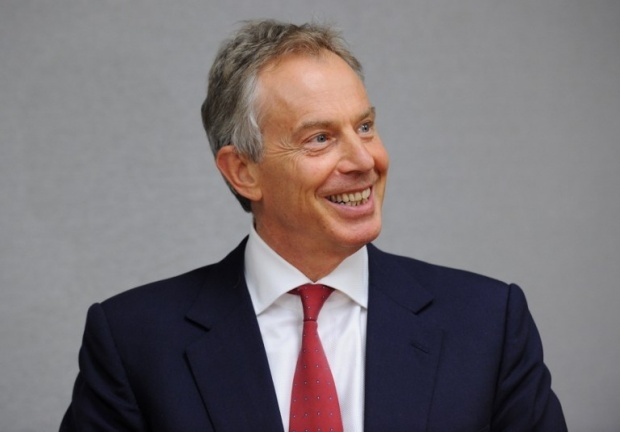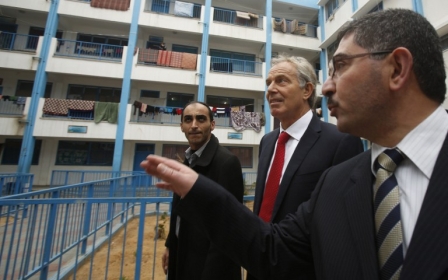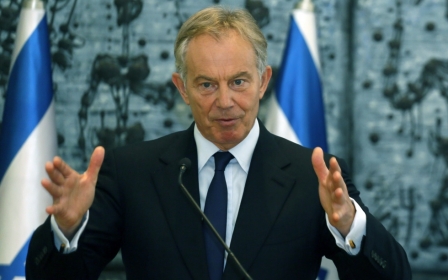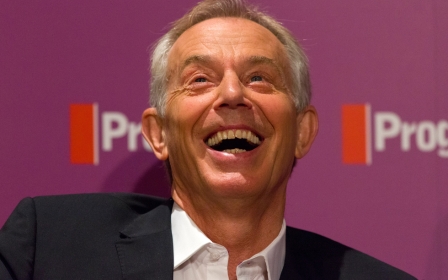Blair, Gaza and all that gas

Of all the bizarre encounters the Palestinian conflict has generated, Tony Blair’s four meetings in Doha with Hamas leader Khaled Meshaal must surely rank as among the oddest.
Here was the Quartet’s Middle East envoy breaking the Quartet’s own rules about not talking to Hamas until it recognises Israel - rules that Blair and Jack Straw enforced as prime minister and foreign secretary by pressing the EU to declare Hamas a terrorist organisation. Two of the four meetings were held before Blair resigned as envoy.
Here was Blair, the man linked in mind, body and soul to the military coup in Egypt (he said the army intervened "at the will of the people" to bring democracy to Egypt) attempting to mediate between Hamas, Israel and Egypt - the two countries that have kept a stranglehold around Gaza’s neck. The Egyptian leader has been an even more zealous enforcer of the blockade than Israeli Prime Minister Benjamin Netanyahu.
In a British context, Blair’s dialogue with Hamas took place as his supporters accused the left-wing candidate in the Labour leadership race, Jeremy Corbyn, of making Labour unelectable if he became leader. Corbyn had advocated talks with Hamas and Hezbollah - a crime of which the man who won power three times was a repeat offender.
Blair did not just talk to Meshaal. He invited him to London, offering him a specific date in June, on which the current prime minister, David Cameron, must have agreed. This is the same prime minister who has strived and failed, so far, to publish a report branding the Muslim Brotherhood presence in Britain as extremist. Bizarre.
And yet Blair kept going, even after the existence of the talks was revealed by Middle East Eye. In the last few days he has still been pushing the deal in Cairo. Why?
His motivation is not obvious. It is surely not out of any belated humanitarian concern for 1.8 million Gazans. As prime minister and peace envoy, Blair had provided Israel with valuable international cover for one operation in Gaza after another. Nor can it be out of any love for Hamas and the Muslim Brotherhood. He regards Islamism as an ideological enemy. To borrow Peter Mandelson’s words, Blair is intensely relaxed about helping dictators with grievous human rights records, in the Emirates, Egypt and Kazakhstan, countries that share his conviction that Islamists must be wiped off the political map.
Blair told Hamas he had secured the agreement of three of the five potential partners to a deal that would open up Gaza’s borders in exchange for an unlimited ceasefire - the Saudis, Emiratis and Jordanians. But without Israel and Egypt, no deal could be said to exist.
After four meetings, Blair and Hamas discussed the possibility of continuing the ceasefire that is currently in place in exchange for an immediate opening of all borders and the immediate payment of the salaries of all government workers in Gaza. These two steps would be followed by talks about a seaport, an airport and the reconstruction of the enclave.
Everything else was off the table: Hamas did not agree, as Blair had been pressing them, to any form of words about political negotiations being the way forward, or anything that would reanimate an Oslo process now considered to be dead. Hamas would only agree to a continuation of the ceasefire, not a hudna with a minimum stated time limit. The ceasefire would only affect Gaza, not the West Bank, where Hamas said resistance against the settlers and the Israeli army would continue; the proposed deal would have had no bearing on a prisoner exchange.
Meshaal took a rain check on the offer of a trip to London. Hamas told Blair they would only take this process forward if it had the backing of Israel and Egypt. That Blair has failed to achieve, and the process is regarded to have reached a dead end, sources told MEE on Tuesday.
In Israel itself, the talks had its backers, mainly, although not exclusively, outside the government. The most notable convert was Naftali Bennett, the head of the far-right Jewish Home party and current education minister, who said a week after fighting began last summer: "The army can wipe out Hamas. We have a strong people which is telling the leadership: 'Do whatever it takes to get it over with'." Now, he has changed his tune. He told Channel 2 recently: "Egypt and the Palestinian Authority [PA] want things to be bad in Gaza so that we will continue fighting; it is good for them ... But at this stage I am against it. The situation is that Hamas is there."
There were others. Israeli President Reuven Rivlin; Yisrael Katz, the transportation and intelligence minister; Yuval Diskin, the former head of Shin Bet; Shaul Mofaz, former defence minister; Yair Naveh, the former deputy chief of staff of the Israeli army; and Efraim Halevy, the former head of Mossad, have all expressed support for talks with Hamas, direct or indirect.
Netanyahu and the government itself remain staunchly opposed. This can either be because Netanyahu cannot accept a deal in which Hamas remains as an active combatant in the West Bank, or because he never intended to reach a deal in the first place. The process of reaching a deal with Hamas was always going to be more inviting to him than the result. The process would mean Hamas having an incentive to keep things quiet, and Netanyahu also would be responding to pressure from citizens in southern Israel. The result would mean abandoning a policy to isolate and weaken Hamas, of which he has been one of the most effective enforcers.
On this, Netanyahu cannot be accused of inconsistency. He makes no distinction here between which brand of Palestinian leader he is dealing with - one who recognises Israel or one who does not. Netanyahu’s record on the national issue is clear: talks never reach a conclusion. They are never anything more than a way of buying time.
He is not alone. If a deal were to be secured that allowed Hamas's 50,000 government workers to be paid, it would be over Mahmoud Abbas's dead body. As the International Crisis Group argues in its latest report, the PA has much to lose from ending the blockade and little to gain.
Since mid-2013 when nearly all the tunnels under the Rafah border with Egypt were closed, the PA’s revenue that Israel collects on goods going into Gaza on its behalf has greatly increased. The report quotes a minister in the national consensus government - appointed by Fatah and involved in Gaza’s reconstruction - who attributes primary responsibility for the stasis to the Palestinian president’s office, which, he said, “has no intention of rebuilding Gaza or taking responsibility for it”.
The signals from Egypt are just as bleak. In June, the head of the Egyptian intelligence was all smiles as he met a delegation from Hamas, and the Rafah border remained open for that week. That was before the attack on 1 July by Sinai fighters, for which Egypt blamed Hamas. The latest signal was the abduction of four members of Hamas' al-Qassam brigades travelling through North Sinai, which Hamas blames on the Egyptian military - not the Islamic State (IS) group.
Who gains from this brief interlude of talks? Obviously, the Quartet’s conditions for excluding Hamas from negotiations have now been breached, as has the EU declaration on Hamas as a terrorist organisation. Blair irritated the Swiss, who see themselves as the chief conduit for negotiations with Hamas, even more than he did Mahmoud Abbas.
However it styled its war on Gaza last year, the Blair talks are a sign that Israel does not want to repeat the experience, at least any time soon. Hamas has become the address to go to in Gaza, and preferable to any available alternative, certainly preferable to the chaos of militias competing with each other to fire rockets off at Israel and the prospect that one day IS could inherit Hamas’ mantle. Exiled Fatah strongman Mohamed Dahlan’s efforts to buy himself back into favour in Gaza by funding weddings has largely been at Abbas’s expense.
For Netanyahu, Blair may have been useful in testing the waters, but it looks as if he has reached his limits as a go-between. For Egypt, the opening of the Rafah border would mean surrendering its chief foreign policy card. There are no signs it is prepared to do this.
Which brings us back to Blair. What was in it for him? This has everyone scratching their heads. But there are some clues.
Last year months before the start of the Doha talks, an academic with access to Khaled Meshaal was approached by Israelis at a conference in Europe. They wanted him to pass on a specific request. If British Gas developed the gas field in Gaza Marine, (a field between 27 and 33 km off the coast of Gaza thought to contain a trillion cubic feet of gas) would Hamas attack it? The academic wanted to know who was asking the question - the Israeli government? No, the reply came: “It was Tony Blair.” The academic refused to pass the message on and told them Tony Blair should contact Meshaal himself.
How curious. Blair privately claims he got involved in the talks at Hamas’ request - as a result of a letter Hamas sent to UN peace process envoy Robert Serry. But his interest in the gas off Gaza’s coast predates that. British Gas Group are clients of JP Morgan, for which Blair was paid as a senior advisor.
This field is, in the words of the Foreign Office, by far the most valuable Palestinian natural resource. Revenues from its output were estimated in 2007 to be worth $4bn. Ariel Sharon was always against its development, and when he pulled out of Gaza, British Gas signed a memorandum with the Egyptian company Egas to sell it there in 2005.
The deal was cancelled a year later when Blair intervened at the behest of then-Israeli premier Ehud Olmert. Thirty times as much has now been discovered in a field off Egypt. Who knows what the fields of Gaza could contain. No conflict? Plenty of interest.
- David Hearst is editor-in-chief of Middle East Eye. He was chief foreign leader writer of The Guardian, former Associate Foreign Editor, European Editor, Moscow Bureau Chief, European Correspondent, and Ireland Correspondent. He joined The Guardian from The Scotsman, where he was education correspondent.
The views expressed in this article belong to the author and do not necessarily reflect the editorial policy of Middle East Eye.
Photo: File picture shows former prime minister and Middle East peace envoy Tony Blair
Middle East Eye propose une couverture et une analyse indépendantes et incomparables du Moyen-Orient, de l’Afrique du Nord et d’autres régions du monde. Pour en savoir plus sur la reprise de ce contenu et les frais qui s’appliquent, veuillez remplir ce formulaire [en anglais]. Pour en savoir plus sur MEE, cliquez ici [en anglais].





